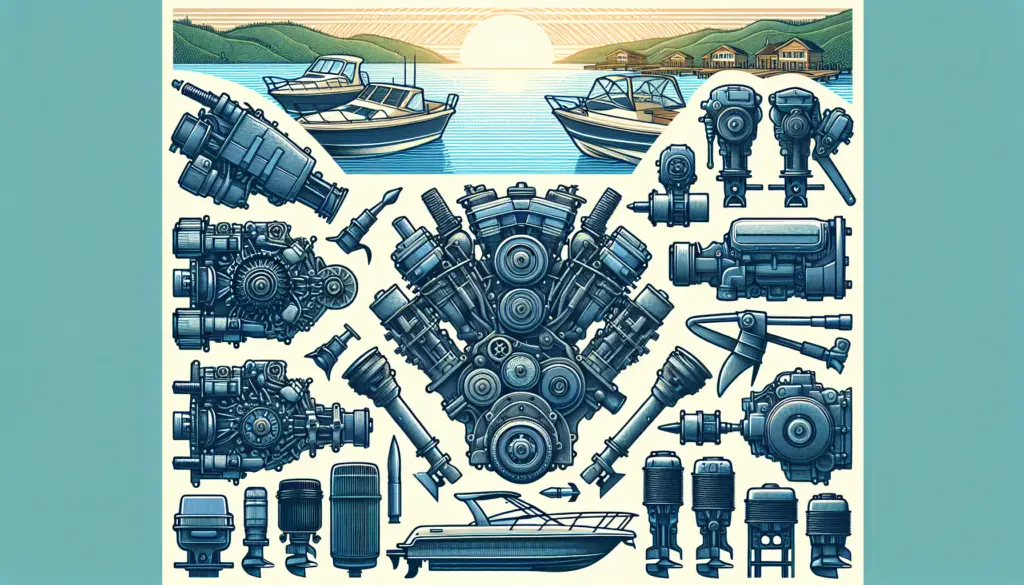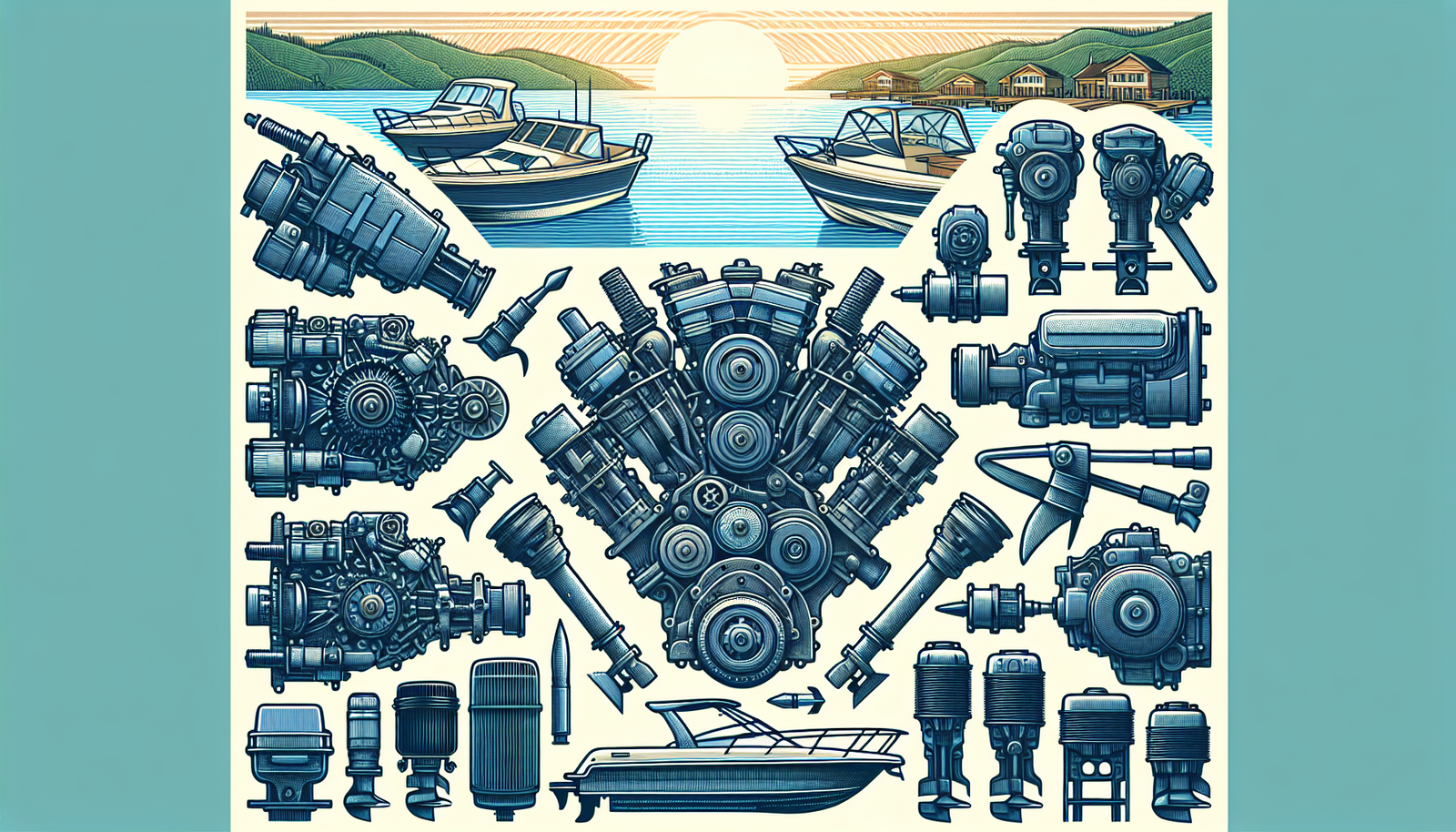Imagine this: You’re standing at the helm of your boat, feeling the breeze on your face, and the soft hum of a reliable engine in your ears. But, wait! You don’t have an engine yet, do you? That’s why you’re here. Well, you’ve come to the perfect place. With the guide “How to Select the Right Boat Engine for Your Boat,” you will soon be out on the water, confident in an engine that perfectly suits your vessel. This guide won’t just hand you a list of engines to buy; instead, it will arm you with critical knowledge on boat engines, facilitating an informed decision that can meet your specific needs and ensure smooth sailing. So, get ready to set sail to the mechanics of boat engines!
Understanding The Basics Of Boat Engines
Selecting the right engine for your boat is a crucial decision that will significantly influence your boating experience. Before delving deep into this process, it’s important to get a grip on the fundamental aspects of boat engines.
Types of Boat Engines
Primarily, boat engines can be categorized into outboard, inboard, sterndrive, and jet engines. These types differ based on their location on the boat, how they propel the boat, and how they’re powered. For instance, outboard engines are portable, placed outside the boat’s hull, and are great for smaller boats. At the same time, inboard engines, located within the boat’s hull, are superb for larger boats with high horsepower requirements.
Basics of Engine Horsepower
Boat engine horsepower is a crucial factor when considering what engine to fit. Horsepower refers to the power the engine generates and is a primary determinant of how fast your boat can go. Higher horsepower means your boat can run at higher speeds and handle adverse conditions more competently. An understanding of your horsepower requirements is thus integral to deciding the right engine for your boat.
Understanding Outboards vs. Inboards
Outboard and inboard engines comprise the majority of boat engine types. Outboards are lightweight, easier to maintain, and simpler to replace. In contrast, inboards offer superior stability, are quieter, and are often more fuel-efficient. The choice between an outboard or inboard engine largely depends on your specific boating needs and preferences.
Factors To Consider When Buying A Boat Engine
When buying an engine, take time to consider key factors which will impact the suitability of the engine to your needs.
Size and Weight of Your Boat
The size and weight of your boat firmly govern the type of engine you’ll need. Larger, heavier boats necessitate engines with high horsepower while smaller, lighter boats can do with less powerful engines. Always ensure the engine you choose is appropriate and can handle your vessel’s weight without straining.
Types of Waters You’ll Be Boating In
The kind of waters you’ll be navigating is equally a significant factor. Rough waters demand engines with high horsepower for stability and maneuverability while still or calm waters can be effectively navigated using less powerful engines. It’s thus imperative to tailor your engine choice to the specific water conditions you expect to encounter.
Level of Usage
How frequently you plan to use your boat is an important consideration. Regular and heavy usage necessitates a robust and durable engine that withstands wear and tear while intermittent usage can get by with a less sturdy engine.
Fuel Efficiency
Fuel efficiency plays a pivotal role in the long-term usage of your boat. Fuel-efficient engines keep operational costs low and have less environmental impact. It’s thus advisable to consider engines with good fuel efficiency ratings.

Exploring Different Boat Engine Brands
There’s a medley of boat engine brands in the market, each offering a range of options that are differently suited to various boating needs.
Popular Boat Engine Brands
Some of the leading brands that have stood the test of time and are lauded for their reliability and performance include Yamaha, Mercury, Honda, Suzuki, and Johnson, among others.
Reliability Ratings of Different Brands
Despite the popularity, not all brands are created equal. The reliability ratings of different brands vary, taking into account factors such as performance, longevity, efficiency, and maintenance needs. It’s therefore crucial to do a comparative analysis of brand reliability before making a choice.
Consideration of The Boat Engine’s Size
The size of the boat engine affects not only the performance but also the boat’s portability.
Understanding Physical Dimensions
The physical dimensions of the engine, such as height, width, and length, will affect its compatibility with your boat. Remember, fitting an engine that’s too large for your boat might lead to performance inefficiencies and instability on the water.
Engine Size and Boat Portability
Engine size also affects boat portability – larger engines tend to make boats more cumbersome to transport, particularly in the case of trailer boats. While smaller engines are lighter and more portable, making for easier transportation.

Noise and Vibration influence on choosing the Boat Engine
Noise and vibration are two less thought-of aspects that nevertheless have a significant impact on the boating experience.
Impact of Engine Noise on Your Boating Experience
Engine noise can greatly affect your comfort and enjoyment on the water. While some might prefer the humming sound of the engine, others may wish for a quiet boating experience. As you choose your engine, factor in how the engine’s noise level could affect your comfort on the boat.
Effects of Engine Vibration on Boat Integrity
Similarly, engine vibration can affect the integrity and lifespan of your boat. Too much vibration can cause wear and tear on the boat’s structure, potentially leading to breakdowns. It’s advised to consider this when selecting an engine and look for ones designed with vibration-dampening technologies.
Proper Examination of the Engine Performance
Testing and evaluating engine performance is a key step in your engine selection process.
Performance Metrics to Look For
Key performance metrics include horsepower, torque, fuel efficiency, and cruising speed. Together, these give you a holistic picture of how an engine will perform under different conditions and over the long term.
Test Runs And Performance Trials
Conducting test runs and performance trials is a practical way to evaluate an engine’s capabilities. While sales material can be helpful, there’s nothing like a real-world test to see how an engine truly performs under a variety of conditions.

Understanding Your Budget For The Boat Engine
Budget is a key determinant in your engine selection process. It’s vital to balance the cost of an engine against its expected performance, longevity, and running costs.
Understanding the Initial Costs
The initial costs involve the purchase price of the engine and the cost of installation. Do an exhaustive market research to find a price range that suits your budget without compromising your boating needs
Estimate of Running and Maintenance Costs
Apart from the initial costs, there are running costs to keep the engine operational, which include fuel and regular maintenance. Add those aspects to your budget plan to get the overall cost of owning a boat engine.
Possible Environmental Impacts of Your Engine Choice
Today, there’s increased emphasis on environmentally friendly boating practices. Your choice of engine plays a major role in that.
Environmentally Friendly Engine Options
Several engine manufacturers are developing engines with low emissions and high fuel efficiencies. Opting for these environmentally friendly options can play a part in reducing pollution and conserving natural resources.
Emission Standards And Regulations
Emission standards and regulations are legal requirements that engines must meet to be sold in certain areas. Ensure your engine choice is compliant with these regulations to avoid penalties and also to contribute to environmental conservation.
Future Maintenance and Support of Boat Engine
Continuous maintenance and support of your boat engine ensure its longevity and optimal performance.
Availability of Spare Parts
Choose a brand or engine model where spares and accessories are readily available. This ensures that in case of failures or breakdowns, your boating activities are not stalled for long awaiting repairs.
Engine Warranty Coverage
Ensure your engine purchase comes with a comprehensive warranty that covers parts, mechanic labor, and servicing. The warranty will save you from incurring costs in case of factory faults or initial engine failures.
Local Service and Support Options
A locally available service and support center or technician is essential for regular maintenance work and for emergency repairs. Explore the service and support options of your engine brand in your vicinity for easy and timely access.
Purchasing From A Reputable Seller
Where you buy your engine is as important as which engine you buy. It’s paramount to consider the reputation of the seller, their pricing, and their background.
Identifying Reputable Sellers
Look for boat engine sellers known for quality products, honest pricing, and excellent after-sale services. This will ensure you get value for your money and have a place to turn for help in case of problems.
Negotiating the Best Pricing
Carefully discuss pricing options with your seller and negotiate where possible to arrive at a price that fits within your budget. Remember, the focus should be on getting a good deal not just the lowest price.
Conducting a Background Check on the Seller
Do not take the words from the seller for granted. Conduct a thorough background check. Consult past customers, check online reviews and ratings to get a clear picture of their integrity and quality of service.
All these considerations will go a long way in helping you choose the ideal boat engine that not only suits your needs but also guarantees longevity, efficiency, and a great boating experience.

